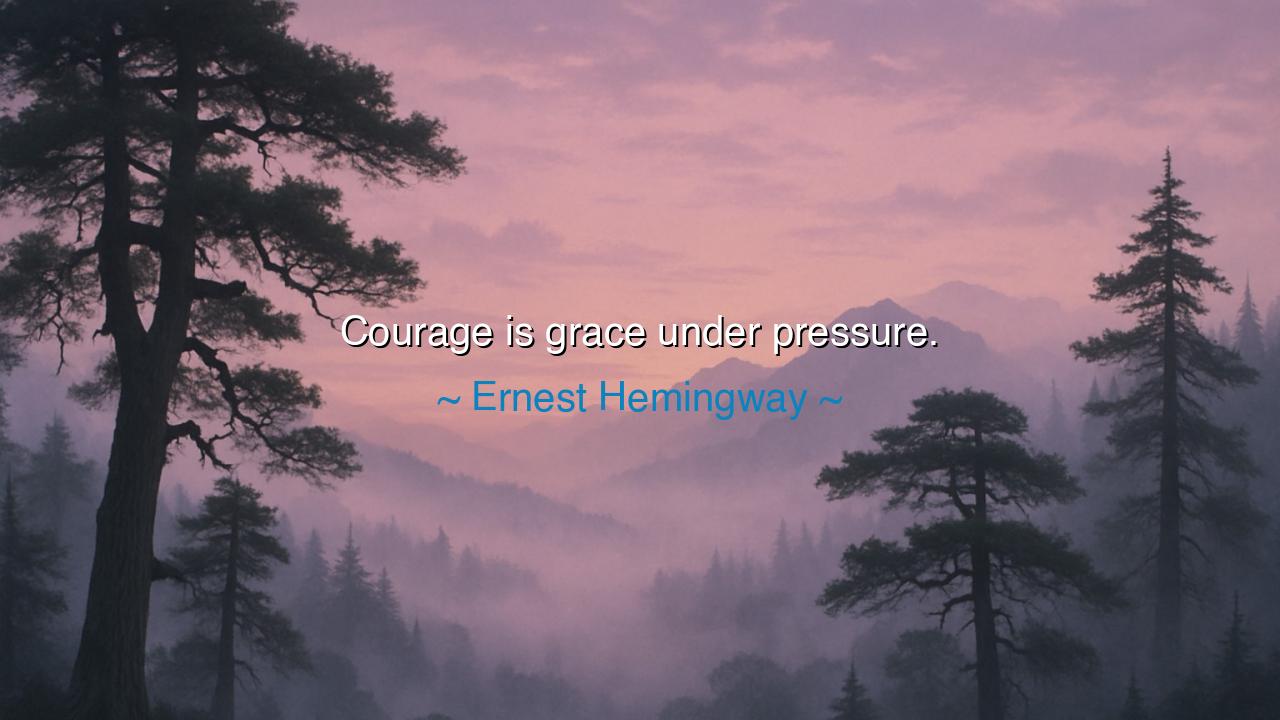
Courage is grace under pressure.






“Courage is grace under pressure.” Thus spoke Ernest Hemingway, a man who lived as he wrote — with intensity, with raw honesty, and with a spirit that refused to yield even in the face of despair. In these few words, Hemingway captures the very essence of true courage — not the loud defiance of the reckless, but the quiet, steady composure of the soul when tested by life’s greatest storms. It is the kind of courage that does not roar or boast, but endures; that meets pain and fear not with panic, but with grace, with dignity, with calm mastery of the self.
To understand Hemingway’s meaning, one must first know the man. He was no stranger to pressure — the trenches of war, the cruelty of the bullring, the solitude of the sea, and the darkness of his own mind. In each, he sought to discover what it meant to be human when the world collapses around you. For him, courage was not about being unafraid; it was about being unbroken. When the body trembles and the heart doubts, yet the spirit stands firm — that, to Hemingway, was the purest form of grace. His heroes, from Santiago in The Old Man and the Sea to Robert Jordan in For Whom the Bell Tolls, all carried within them that noble stillness — the ability to act with beauty and honor, even when the end seemed inevitable.
The ancients would have understood this wisdom well. The Stoics of Greece and Rome — Seneca, Epictetus, and Marcus Aurelius — all taught that the measure of a man lies not in what he achieves when life is easy, but in how he bears himself when it is not. To be calm amid chaos, to smile in suffering, to hold to virtue when surrounded by vice — these, they said, were the hallmarks of greatness. Hemingway, though a modern man, was in spirit one of their kin. He believed that courage is not something one can simply possess; it must be forged in trial, like steel in fire. And the beauty of that steel is not in its strength alone, but in its polish — its grace.
History, too, gives us living proof of this truth. When Nelson Mandela spent twenty-seven years in prison, enduring cruelty and isolation, he did not allow bitterness to consume him. When the world expected anger, he offered forgiveness. When the nation teetered on the brink of civil war, he stood serene, calm as the eye of a storm. This was grace under pressure — the courage not merely to resist one’s enemies, but to master one’s own rage and sorrow. Through his restraint, Mandela became greater than a warrior; he became a teacher of humanity, showing that true power lies in self-control, not vengeance.
There is also the quiet grace of the ordinary — the mother who endures hardship to feed her children, the nurse who stands firm in the chaos of an emergency ward, the soldier who comforts a comrade though his own wounds bleed. In such moments, courage wears no medals, speaks no grand words; it simply acts with dignity, unshaken by fear. Hemingway’s phrase reminds us that courage is not the absence of pain but the mastery of it — the art of remaining human when the world demands hardness.
“Grace under pressure” is thus more than a description — it is a discipline, a way of living. It calls us to face difficulty not with despair but with elegance of spirit. When the heart aches, do not lash out; when life tightens around you, breathe and stand firm. The river does not conquer the stone by force, but by persistence. So too must we endure — with calm, with patience, with the quiet courage that honors life even in its darkest hour.
Therefore, O seekers of strength, learn this sacred lesson: true courage is calm, not loud; steady, not rash; graceful, not violent. When you are pressed by hardship, remember that grace is the form of strength that leaves beauty in its wake. Speak gently when others shout. Act wisely when others panic. Hold your dignity as the world shakes, and you will find that courage has already made its home within you.
For in the end, as Hemingway teaches, courage is not about conquering the world — it is about conquering yourself. To stand tall in silence, to endure with grace when every nerve cries out to break — that is the mark of the noble soul. And when you have learned to carry that grace within you, no pressure, however great, can destroy your spirit — for you will have discovered the eternal truth that courage and grace are one.






AAdministratorAdministrator
Welcome, honored guests. Please leave a comment, we will respond soon